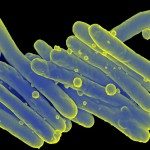Lien vers Pubmed [PMID] – 26538472
Mol. Microbiol. 2015 Nov;
Understanding the molecular strategies used by Mycobacterium tuberculosis to invade and persist within the host is of paramount importance to tackle the tuberculosis pandemic. Comparative genomic surveys have revealed that hadC, encoding a subunit of the HadBC dehydratase, is mutated in the avirulent M. tuberculosis H37Ra strain. We show here that mutation or deletion of hadC affects the biosynthesis of oxygenated mycolic acids, substantially reducing their production level. Additionally, it causes the loss of atypical extra-long mycolic acids, demonstrating the involvement of HadBC in the late elongation steps of mycolic acid biosynthesis. These events have an impact on the morphotype, cording capacity and biofilm growth of the bacilli as well as on their sensitivity to agents such as rifampicin. Furthermore, deletion of hadC leads to a dramatic loss of virulence: an almost 4-log drop of the bacterial load in the lungs and spleens of infected immunodeficient mice. Both its unique function and importance for M. tuberculosis virulence make HadBC an attractive therapeutic target for tuberculosis drug development.



